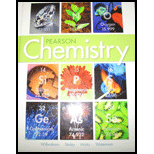
Chemistry 2012 Student Edition (hard Cover) Grade 11
12th Edition
ISBN: 9780132525763
Author: Prentice Hall
Publisher: Prentice Hall
expand_more
expand_more
format_list_bulleted
Question
Chapter 11.2, Problem 14SP
Interpretation Introduction
Interpretation: To determine the balanced chemical equation for the formation of magnesium nitride.
Concept Introduction: When the count of atoms in both directions of the
Expert Solution & Answer
Answer to Problem 14SP
The balanced chemical reaction will be:
Explanation of Solution
When magnesium reacts with nitrogen atoms, then it will form magnesium nitride.
Its balanced chemical reaction can be written as:
Chapter 11 Solutions
Chemistry 2012 Student Edition (hard Cover) Grade 11
Ch. 11.1 - Prob. 1SPCh. 11.1 - Prob. 2SPCh. 11.1 - Prob. 3SPCh. 11.1 - Prob. 4SPCh. 11.1 - Prob. 5SPCh. 11.1 - Prob. 6SPCh. 11.1 - Prob. 7LCCh. 11.1 - Prob. 8LCCh. 11.1 - Prob. 9LCCh. 11.1 - Prob. 10LC
Ch. 11.1 - Prob. 11LCCh. 11.2 - Prob. 12SPCh. 11.2 - Prob. 13SPCh. 11.2 - Prob. 14SPCh. 11.2 - Prob. 15SPCh. 11.2 - Prob. 16SPCh. 11.2 - Prob. 17SPCh. 11.2 - Prob. 18SPCh. 11.2 - Prob. 19SPCh. 11.2 - Prob. 20LCCh. 11.2 - Prob. 21LCCh. 11.2 - Prob. 22LCCh. 11.2 - Prob. 23LCCh. 11.2 - Prob. 24LCCh. 11.3 - Prob. 25SPCh. 11.3 - Prob. 26SPCh. 11.3 - Prob. 27SPCh. 11.3 - Prob. 28SPCh. 11.3 - Prob. 29LCCh. 11.3 - Prob. 30LCCh. 11.3 - Prob. 31LCCh. 11.3 - Prob. 32LCCh. 11.3 - Prob. 33LCCh. 11 - Prob. 34ACh. 11 - Prob. 35ACh. 11 - Prob. 36ACh. 11 - Prob. 37ACh. 11 - Prob. 38ACh. 11 - Prob. 39ACh. 11 - Prob. 40ACh. 11 - Prob. 41ACh. 11 - Prob. 42ACh. 11 - Prob. 43ACh. 11 - Prob. 44ACh. 11 - Prob. 45ACh. 11 - Prob. 46ACh. 11 - Prob. 47ACh. 11 - Prob. 48ACh. 11 - Prob. 49ACh. 11 - Prob. 50ACh. 11 - Prob. 51ACh. 11 - Prob. 52ACh. 11 - Prob. 53ACh. 11 - Prob. 54ACh. 11 - Prob. 55ACh. 11 - Prob. 56ACh. 11 - Prob. 57ACh. 11 - Prob. 58ACh. 11 - Prob. 59ACh. 11 - Prob. 60ACh. 11 - Prob. 61ACh. 11 - Prob. 62ACh. 11 - Prob. 65ACh. 11 - Prob. 66ACh. 11 - Prob. 67ACh. 11 - Prob. 68ACh. 11 - Prob. 69ACh. 11 - Prob. 70ACh. 11 - Prob. 71ACh. 11 - Prob. 72ACh. 11 - Prob. 73ACh. 11 - Prob. 74ACh. 11 - Prob. 75ACh. 11 - Prob. 76ACh. 11 - Prob. 77ACh. 11 - Prob. 78ACh. 11 - Prob. 1STPCh. 11 - Prob. 2STPCh. 11 - Prob. 3STPCh. 11 - Prob. 4STPCh. 11 - Prob. 5STPCh. 11 - Prob. 6STPCh. 11 - Prob. 7STPCh. 11 - Prob. 8STPCh. 11 - Prob. 9STPCh. 11 - Prob. 10STPCh. 11 - Prob. 11STP
Knowledge Booster
Similar questions
- For the titration of a divalent metal ion (M2+) with EDTA, the stoichiometry of the reaction is typically: 1:1 (one mole of EDTA per mole of metal ion) 2:1 (two moles of EDTA per mole of metal ion) 1:2 (one mole of EDTA per two moles of metal ion) None of the abovearrow_forwardPlease help me solve this reaction.arrow_forwardIndicate the products obtained by mixing 2,2-dimethylpropanal with acetaldehyde and sodium ethoxide in ethanol.arrow_forward
- Synthesize 2-Ethyl-3-methyloxirane from dimethyl(propyl)sulfonium iodide using the necessary organic or inorganic reagents. Draw the structures of the compounds.arrow_forwardSynthesize 2-Hydroxy-2-phenylacetonitrile from phenylmethanol using the necessary organic or inorganic reagents. Draw the structures of the compounds.arrow_forwardSynthesize N-Methylcyclohexylamine from cyclohexanol using the necessary organic or inorganic reagents. Draw the structures of the compounds.arrow_forward
- Synthesize N-Methylcyclohexylamine from cyclohexanol using the necessary organic or inorganic reagents. Draw the structures of the compounds.arrow_forwardIf possible, please provide the formula of the compound 3,3-dimethylbut-2-enal.arrow_forwardSynthesize 1,4-dibromobenzene from acetanilide (N-phenylacetamide) using the necessary organic or inorganic reagents. Draw the structures of the compounds.arrow_forward
- Indicate the products obtained by mixing (3-oxo-3-phenylpropyl)triphenylphosphonium bromide with sodium hydride.arrow_forwardWe mix N-ethyl-2-hexanamine with excess methyl iodide and followed by heating with aqueous Ag2O. Indicate the major products obtained.arrow_forwardIndicate the products obtained by mixing acetophenone with iodine and NaOH.arrow_forward
arrow_back_ios
SEE MORE QUESTIONS
arrow_forward_ios
Recommended textbooks for you
 ChemistryChemistryISBN:9781305957404Author:Steven S. Zumdahl, Susan A. Zumdahl, Donald J. DeCostePublisher:Cengage Learning
ChemistryChemistryISBN:9781305957404Author:Steven S. Zumdahl, Susan A. Zumdahl, Donald J. DeCostePublisher:Cengage Learning ChemistryChemistryISBN:9781259911156Author:Raymond Chang Dr., Jason Overby ProfessorPublisher:McGraw-Hill Education
ChemistryChemistryISBN:9781259911156Author:Raymond Chang Dr., Jason Overby ProfessorPublisher:McGraw-Hill Education Principles of Instrumental AnalysisChemistryISBN:9781305577213Author:Douglas A. Skoog, F. James Holler, Stanley R. CrouchPublisher:Cengage Learning
Principles of Instrumental AnalysisChemistryISBN:9781305577213Author:Douglas A. Skoog, F. James Holler, Stanley R. CrouchPublisher:Cengage Learning Organic ChemistryChemistryISBN:9780078021558Author:Janice Gorzynski Smith Dr.Publisher:McGraw-Hill Education
Organic ChemistryChemistryISBN:9780078021558Author:Janice Gorzynski Smith Dr.Publisher:McGraw-Hill Education Chemistry: Principles and ReactionsChemistryISBN:9781305079373Author:William L. Masterton, Cecile N. HurleyPublisher:Cengage Learning
Chemistry: Principles and ReactionsChemistryISBN:9781305079373Author:William L. Masterton, Cecile N. HurleyPublisher:Cengage Learning Elementary Principles of Chemical Processes, Bind...ChemistryISBN:9781118431221Author:Richard M. Felder, Ronald W. Rousseau, Lisa G. BullardPublisher:WILEY
Elementary Principles of Chemical Processes, Bind...ChemistryISBN:9781118431221Author:Richard M. Felder, Ronald W. Rousseau, Lisa G. BullardPublisher:WILEY

Chemistry
Chemistry
ISBN:9781305957404
Author:Steven S. Zumdahl, Susan A. Zumdahl, Donald J. DeCoste
Publisher:Cengage Learning

Chemistry
Chemistry
ISBN:9781259911156
Author:Raymond Chang Dr., Jason Overby Professor
Publisher:McGraw-Hill Education

Principles of Instrumental Analysis
Chemistry
ISBN:9781305577213
Author:Douglas A. Skoog, F. James Holler, Stanley R. Crouch
Publisher:Cengage Learning

Organic Chemistry
Chemistry
ISBN:9780078021558
Author:Janice Gorzynski Smith Dr.
Publisher:McGraw-Hill Education

Chemistry: Principles and Reactions
Chemistry
ISBN:9781305079373
Author:William L. Masterton, Cecile N. Hurley
Publisher:Cengage Learning

Elementary Principles of Chemical Processes, Bind...
Chemistry
ISBN:9781118431221
Author:Richard M. Felder, Ronald W. Rousseau, Lisa G. Bullard
Publisher:WILEY